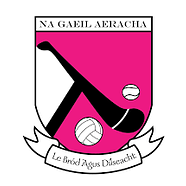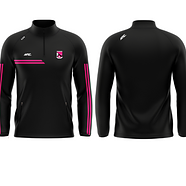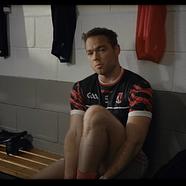By John Harrington
Read the full article on the GAA website: https://www.gaa.ie/news/na-gaeil-aeracha-are-marching-forward-with-pride/
This Saturday, members of Ireland's first explicitly LGBTQ+ inclusive GAA club, Na Gaeil Aeracha (the Rainbow Gaels), will march in the Dublin Pride Parade as part of the GAA’s delegation.
It’ll be a chance to celebrate just how remarkably far the Dublin-based club have come in a very short period of time.
It all began when Karl Shannon, now Chairperson of Na Gaeil Aeracha, wondered aloud on Twitter whether anyone would be interested in “genuinely getting a queer GAA team going”.
The deluge of retweets, quote tweets, and likes that followed in the coming days emphatically told him that, yes, there very much was.
Na Gaeil Aeracha were quickly formed with help from the GAA’s Diversity and Inclusion officer, Geraldine McTavish. Last year they fielded a Ladies Football team in Dublin and this year they also have a men’s Gaelic Football team.
They already have well over 200 club members and seemed destined to continue going from strength to strength in the coming years with plans to also field hurling and camogie teams in the not too distant future.
GAA.ie caught up with Karl Shannon and club Vice-chairperson, Emma Loo, to find out what the journey has been like so far and the club’s plans for the future.
GAA.ie: I’d imagine setting up a new GAA club from scratch is a huge logistical challenge, but has it also been an empowering one?
Karl Shannon: Yeah, absolutely, it's definitely been empowering. One thing that comes to mind is that our LGFA team won their first match recently. I think that was a big full circle moment when you could kind of look back and see how far we've come because this was second year our LGFA team was running. Of course last year we weren't expecting a lot of wins because we had low membership and so it was it was kind of hard there. So now to see them winning matches and the spirit that they have, it’s just fantastic.
Emma Loo: I think something that is always in my mind is it was always more paperwork than football at the start from when we were just coming together and having all these meetings and we never actually thought that we would actually get on the pitch.
Like Karl said, we had the LGFA team first of all last, the GAA had to wait a little bit longer until this year.
Last year we had 22 players that came out of the blue and they had no idea who we really were. Some had never picked up a football before, some had come back to the sport. They were taking a risk and it paid off. It was June 2021 that we played our first LGFA match. And this year now we have actually won matches. We have three league matches under our belts and currently we're playing the cup and we have two wins so far. And it's just monumental.
The Gaelic Games family encourage all clubs to show their visibility on pride weekend and express solidarity with those who are LGBTQI+.
It's a moment where you go, wow. It has started just from discussions and pure belief and spirit and just people actually playing the game for the love of it. And it's just support all across the board. The GAA team now, it's great to see them playing too. And I think, you know, in a year's time maybe even this year there might be a win. But definitely it took a year for the LGFA to get that first win so there's no pressure on the GAA and no pressure across the board anyway.
GAA.ie: That first victory for the club must have been a hugely satisfying moment for everyone involved with the club?
Emma Loo: I think it was the 22nd of April and I was actually in Disneyland and, Karl, I think you were away somewhere too. I just remember one of the players on the LGFA team texted me all in capitals saying “WE'RE WINNING! And we're winning very, very well!”
I said, just get me on FaceTime. I need to see this. I was surrounded by Mickey Mouse ears everywhere but I wanted to be there at the game and they held me on FaceTime on the phone the whole way through and I was part of it. I was part of the celebrations. It was just such a really wholesome feeling to see that, wow, we did that, and we had such belief in each other.
I felt very emotional. It was a full circle moment because the team we played against was the very first team we ever had our first game against, Shankill 'B'. It was on their home ground as well so it was the same pitch we played our first match on. We were chuffed even playing in 2021. We were slaughtered in that first match but it didn't matter though.
GAA.ie: Karl, was that an emotional moment for you too?
Karl Shannon: Absolutely yeah, it really was. As Emma says, it's like that full circle moment, that's such a good way to put it. And, yes, there was so much paperwork at the start. There was a lot of reaching out to contacts and trying to drive that. We recruiting for registered members and we were in touch with Geraldine McTavish, the GAA's Diversity and Inclusion Officer, so there was lots to do lots to do and prep on.
And then once we started training, then just playing came more into it but there still is and probably always will be a lot of admin. Unfortunately, I couldn't make that first win but I ended up going to their next match and they won that one as well. To see the spirit of everyone and everybody cheering as opposed the first year when it would have been like, come on, let's just keep the head up. Now everyone was saying, let's keep going, let's score more goals and all this kind of stuff. That really does hit you hard, definitely.
GAA.ie: How many members does the club have now?
Emma Loo: I feel like there's over 240/250 members. Now that's combined GAA/LGFA. We've at least 60 registered on the LGFA team and I know it's nearly double that now on the GAA team and there’s also non-playing members.
It's all I believe through word of mouth from social media because we're not a parish. We aren't in the local community or a specific district or anything. So, it's definitely different to how most clubs are set up. If you were to ask most people how did you hear about the club, they saw posts on Instagram or someone shared it to them or they saw it on Sporting Pride or whatnot. It's a very community-based aspect in that no one had to do trials, absolutely everyone was welcome. It's definitely shifted organically from, ‘we're here for a bit of fun’, to, ‘we actually are really good and we want to play’. That's never pushed by me or by management and it's very fulfilling to see that, wow, people are in it and they have a passion for it.
GAA.ie: Does the number of people who have joined the club in such a short period of time underscore that there was a need for a club like Na Gaeil Aeracha?
Karl Shannon: You’re looking at around 150 playing members who may not have joined any other sporting group. So in that in that sense that’s a lot of people who would have been missing out, and a lot of people the GAA would have been missing out on. I think it definitely does reflect that there was simply a need for a space like this. And I don't think it necessarily reflects bad previously on the GAA or the LGFA at all.
I think I think it's just a case of a lot of people, and this will come from my own experience, will have that anxiety, that 'what if' situation of getting back involved in sports and putting yourself in typically heteronormative spaces. There's always that apprehension around what if something happens and I'm going to be a minority, what if I'm not well received and stuff like that. This completely eliminates all of that anxiety. You come and you already know that you're going to be welcome, you know that your sexuality or your gender isn't going to be a factor that can potentially cause an issue. You're with similarly experienced people.
Emma Loo: When we started it was never an LGBTQ+ club, it was simply an inclusive club. And from like two months in we still didn't know anyone's sexuality or gender identity. It didn't matter. We never asked that, it wasn't like a requirement or a qualification. I think by just saying that we were inclusive and that people saw that, wow, there's rainbows everywhere, they're doing a lot advocacy, and there's allyship. I think that if people were part of the LGBTQ+ community, it's a shared understanding, it's a lived experience. I don't even know how to capture that feeling. But it's just a shared understanding on another level. And I think that's why a lot of people feel safe to come along. And even allies as well. The more the merrier.
GAA.ie: It sounds like a real mixture of people have joined the club? Those who have played previously and those who have never played before?
Emma Loo: ‘Yeah, we've had people who picked up a football for the first time. There's a girl from New Zealand who played netball and she's brilliant, she's soloing down the pitch now. It's really nice to see the people who maybe also have played at a competitive level because it's a really nice balance. And people who've maybe played more competitively are able to teach less experienced players. And it's just it's a really nice balance. A lot of people are saying, if they played competitively before, it's a nice break away from the intensity. There's one person on the LGFA team, we actually played in the same home club before in quite a high division, and just taking your foot off the pedal and getting more fun out of it, I think that's what people really appreciate.
GAA.ie: Karl, as you’ve alluded to, your own story might be quite a common one. You played with your home club until your mid-teens and then stopped playing because you felt like you didn’t fit in anymore?
Karl Shannon: My home club was Fingallians and I played with them from when I was probably around seven years old. And, as you said, I stopped when I turned about 14, maybe 15. It wasn't because I was in any trouble with the GAA, it wasn't because my teammates were giving me any stick, but it was because that was the age when I was starting to understand that I was different.
I wasn't fitting in in the sense of I had a different sexual orientation, maybe some stand-out characteristics that separated me. And, again, with that, you know, it is such a huge thing that you go through, especially at such a young age. In your adolescence, there's so much going on. With that there does come a sense of...I feel like for me, I almost pushed myself out because I had the anxiety that I if I if I didn't push myself out someone else would and that that's where it was going.
So, unfortunately, I did take a step back, and that was quite a quite a unfortunate time in my life. But, now, as I’ve embraced my sexuality and I've learned a lot about myself and now we have Na Gaeil Aeracha, it feels strange looking back at how different it was then and how different I feel now. I feel I feel so much more confident. I feel like my mental health has increased lightyears ahead.
Read the full article on the GAA website: https://www.gaa.ie/news/na-gaeil-aeracha-are-marching-forward-with-pride/








